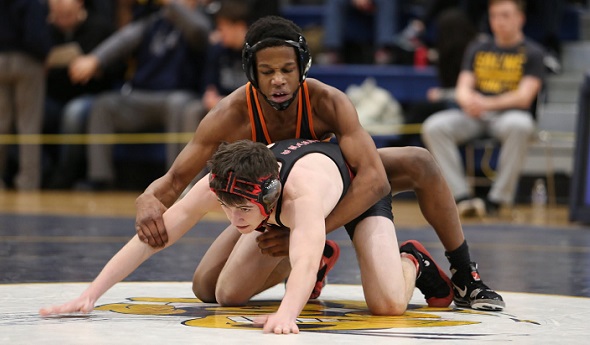
Belleville Twins March to Finals Together
By
Tom Markowski
Special for Second Half
March 2, 2016
BELLEVILLE – Caleb Brown continues to be haunted by what he considers a grim disappointment in his Belleville wrestling career.
 Last season, Brown lost during what those in the wrestling fraternity call the “blood round.” This is the consolation round, a match for fourth place, at the Individual Wrestling Regionals. Brown lost by one point in the 152-pound weight class to an opponent he had defeated earlier in the season and, thus, missed qualifying for the MHSAA Finals.
Last season, Brown lost during what those in the wrestling fraternity call the “blood round.” This is the consolation round, a match for fourth place, at the Individual Wrestling Regionals. Brown lost by one point in the 152-pound weight class to an opponent he had defeated earlier in the season and, thus, missed qualifying for the MHSAA Finals.
He was devastated but not consumed by it. For one, that was his junior season. Brown rededicated himself during the offseason. He continued to run cross country to keep his weight down and also increase his endurance.
This season Brown broke through barriers, claiming the Wayne County and Division 1 Regional championships at 152.
As proud as he is of reaching this point, it’s made even more special by the fact that he’ll enter The Palace of Auburn Hills on Thursday with his twin brother Chris. Chris Brown competes at 130. Last season he qualified for the MHSAA Finals at 119 and won a first-round match before losing his next.
“It’s really cool,” Caleb said. “I missed out last year. Being a senior, it’s cool.
“(Winning the regional) didn’t hit me right away. I was just talking about it with my teammates, and that’s when it hit me. I was really focused on winning the match.”
Caleb is 44-4 this season and will face Kyle Minor of Roseville in Thursday’s first round.
Chris is 47-2 and will go against Lee Grabowski of Brighton.
The Browns say having a twin who competes in the same sports is an advantage, if for no other reason than it enhances one’s competitive nature.
They both started wrestling in middle school by chance.
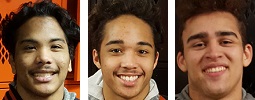 “We played football in the beginning,” Chris said. “The coach told us to wrestle to keep in shape. I was terrible in the beginning. But we’ve never been known as quitters. I like the individualism. You can’t use the excuse your team lost it for you.”
“We played football in the beginning,” Chris said. “The coach told us to wrestle to keep in shape. I was terrible in the beginning. But we’ve never been known as quitters. I like the individualism. You can’t use the excuse your team lost it for you.”
Once they entered high school, the Browns gravitated even more toward the sport. But it wasn’t until their sophomore season that they became proficient at it.
For Chris, there was one match that showed he could compete against the best.
“My sophomore year was my first on varsity,” he said. “I went against a ranked opponent, and I won by a point. That was huge for my confidence.”
Coinciding with the Browns’ rise was the return of Derek Phillips as coach. Phillips started coaching in 1994 and stayed 11 seasons before taking time off to help raise two children. He remained within the school district as a teacher, but the time commitment of teaching and coaching together was not conducive to spending quality time with his sons.
In 2013, Phillips returned. He has been a mentor for the Browns and a third senior MHSAA Finals qualifier, David Tooley (215).
Phillips was the one who encouraged the Browns to compete in cross country.
“It goes hand in hand,” Phillips said of the two sports. “I love it. They come into the wrestling season in shape. All three have over 100 wins and all three are good students. They’re a coach’s dream.”
Tooley is a little different. It’s not because he plays football instead of competing in cross country. And it’s not because he’s a three-sport athlete (also plays baseball). It’s his warm-up routine that causes many to take a second look, scratch their heads or both.
It’s more than a routine. It’s a dance. Sort of. He got the idea from watching a wrestler from Southgate Anderson who competed against his brother, Mark Tooley, when the elder Tooley wrestled for Belleville in 2011.
“It’s like no other,” David Tooley said. “It’s an active movement. It’s like a dance, and it’s a little embarrassing.”
Whatever works.
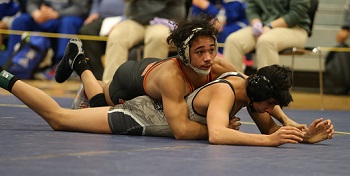 The Browns’ warmup routines are a little less flamboyant, but they do get a kick out of watching their teammate go through his routine. Chris likes to listen to music just before his matches. Caleb prefers listening to his coach, receiving last-minute instructions.
The Browns’ warmup routines are a little less flamboyant, but they do get a kick out of watching their teammate go through his routine. Chris likes to listen to music just before his matches. Caleb prefers listening to his coach, receiving last-minute instructions.
Away from the mat, the Browns are constantly challenging each other. Take running, for example.
“We try to one-up each other,” Chris said. “We’ve always been competitive. I’m faster than he is, when we run cross country. We’re not too far apart though.”
Caleb judges a person’s speed all together differently.
“He might beat me in cross country,” he said. “But if it’s a true test of speed, I’m faster.”
 Tom Markowski is a columnist and directs website coverage for the State Champs! Sports Network. He previously covered primarily high school sports for the The Detroit News from 1984-2014, focusing on the Detroit area and contributing to statewide coverage of football and basketball. Contact him at [email protected] with story ideas for Oakland, Macomb and Wayne counties.
Tom Markowski is a columnist and directs website coverage for the State Champs! Sports Network. He previously covered primarily high school sports for the The Detroit News from 1984-2014, focusing on the Detroit area and contributing to statewide coverage of football and basketball. Contact him at [email protected] with story ideas for Oakland, Macomb and Wayne counties.
PHOTOS: (Top) Chris Brown works to gain control during one of his Division 1 Regional matches Feb. 20. (Middle) Caleb Brown, Chris Brown, David Tooley.(Below) Caleb Brown works an opponent toward a potential pin during one of his Regional matches. (Top and below photos by Douglas Chapman.)
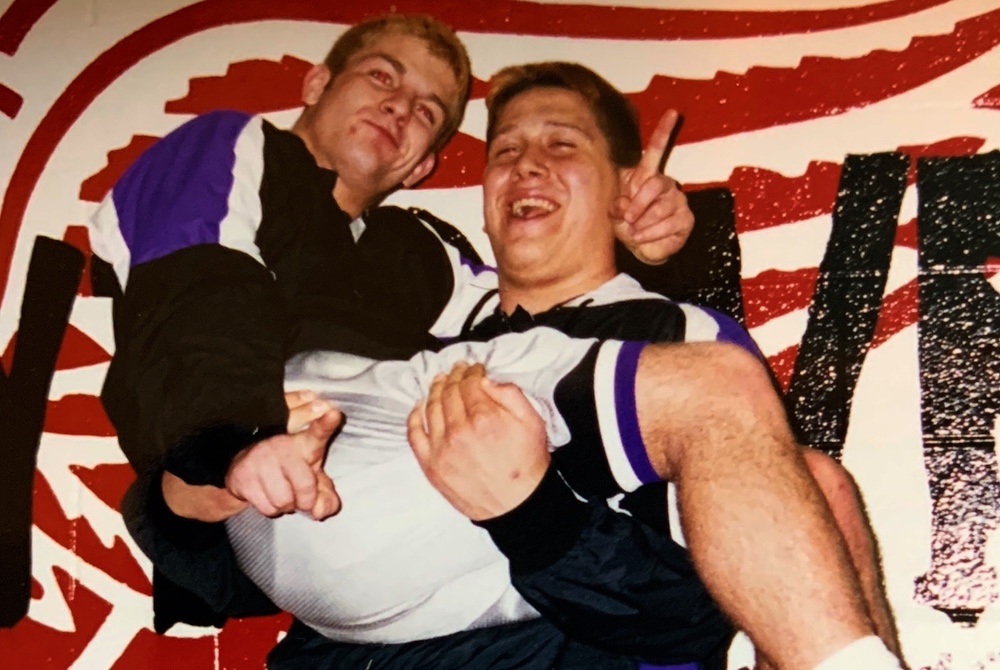
Caro Champs Find Common Ground Again as Mental Health Providers
By
Paul Costanzo
Special for MHSAA.com
July 8, 2021
Phil Millerov and Phil Niklowicz wanted to do more than simply defeat opponents when wrestling at Caro High School.
They wanted to dominate – physically and mentally.
 “We had this thing between us where we wanted to be done, and (opponents) didn’t want to come back on the mat with us,” Millerov said.
“We had this thing between us where we wanted to be done, and (opponents) didn’t want to come back on the mat with us,” Millerov said.
Twenty years later, both spend their days building people up. Millerov is a licensed professional counselor, while Niklowicz is a licensed therapist.
“I went out there looking to dominate and make sure it was known that I am the superior wrestler in all facets,” Niklowicz said. “I would try to run up as many points as fast as I can. I would teach the same thing when coaching, specifically with my nephew. You’re saying, ‘Listen, we want to break these people.’ Then the next day, in a therapy session, it’s like, ‘Let’s build up your self-esteem and set some goals to boost ourselves up.’”
The close friends and two faces of Caro’s surging wrestling program in the late 1990s now have very similar careers. Millerov – who finished second, third and first at 275 pounds in the 1998, 1999 and 2000 MHSAA Finals, respectively -- works in private practice at Transitions Counseling Service in Greenville, where he specializes in substance abuse disorders. He also has served as a Class 1 Fellow at the WK Kellogg Foundation.
Niklowicz – a two-time MHSAA Finals champion (1999 and 2000) and four-time placer – is working in private practice in Southfield, seeing mostly children. He also works in adult foster care with patients who have had traumatic brain injuries.
“He and I went and hiked Pictured Rocks at the beginning of May,” Millerov said. “And we joked about how nobody would have guessed that we’d be doing this now.”
That Millerov and Niklowicz are still close does not come as a surprise. Their friendship began when their wrestling careers did, as 6-year-olds in the Caro Growlers program. As they were becoming two of the state’s top wrestlers, they would share rides to tournaments, and their families grew close.
In high school, despite their size difference – Niklowicz wrestled at 135 his senior year – it wasn’t uncommon to see them warming up together.
“We were definitely easy going and liked to mess around a lot,” Niklowicz said. “We used to mess around before meets and throw each other. He would jump and I would throw him. People would look at us like, ‘Why is that little guy throwing that big guy?’”
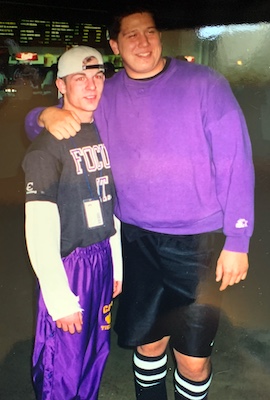 While their teams never made it out of the Regional, Millerov and Niklowicz helped set the stage for a program that would become among the best in Division 3 throughout the 2000s, qualifying for five straight Quarterfinals from 2003-07 and winning the Division 3 Finals title in 2003.
While their teams never made it out of the Regional, Millerov and Niklowicz helped set the stage for a program that would become among the best in Division 3 throughout the 2000s, qualifying for five straight Quarterfinals from 2003-07 and winning the Division 3 Finals title in 2003.
Individually, they were among the most well-known and feared wrestlers in the state.
“Niklowicz and I were fortunate to have each other, because we pushed each other,” Millerov said. “We were in constant competition with each other and ourselves. Just to kind of push each other, it was a great thing.”
Niklowicz finished fifth as a freshman and third as a sophomore before winning back-to-back titles to close out his career. In 1999, he defeated Nick Oertel of Goodrich 9-2 in the 125-pound final, and the next year he defeated Oertel’s teammate, Ryan Tripp, 7-5 at 135. Tripp would go on to win an individual title the following year. Niklowicz would finish his career with 214 victories.
“I think probably both (Finals titles) were equal,” Niklowicz said. “I think there was probably a little more stress going into my senior year. My motivation always came from improving, then it was maintaining the state title. You don’t want to go the opposite direction.”
Millerov lost a tight 6-4 decision against Remus Chippewa Hills’ Bob Kozlowski in the MHSAA Finals as a sophomore, and had an epic 12-10 match against future NFL defensive lineman Jason Babin of Paw Paw in the 1999 semifinals before fighting back to take third. The next year, he won his title via first-period pin against Dan Kliphuis, a two-time runner-up from Grand Rapids West Catholic. Millerov finished with 196 career wins and set the state record for pins in a career (160), which was broken the next season by Nick Simmons of Williamston and is now held by Justin Zeerip of Hesperia. The 56 pins Millerov recorded his senior season remains second all-time to Simmons, who had two seasons with 57.
“I never really thought about (the pin record) to be quite honest,” Millerov said. “It was just kind of in the background. It didn’t matter; all I cared about was winning this match, and I wanted to do it in the most effective, efficient way I could.”
They both continued their wrestling careers, but went their separate ways in college, with Millerov heading to Neosho County Community College in Kansas and Niklowicz to Virginia Tech.
Millerov had interest from several Division I schools coming out of high school, including some in the Big Ten, but he admits his grades weren’t good enough at the time. Neosho provided a chance to compete with some of the best in the country while at the junior college level, however, as the team took second at the National Junior College Athletic Association championships in 2002.
He transferred to Central Michigan after his sophomore year, joining his girlfriend – now his wife – who was already attending, and walking onto the wrestling team. While his relationship lasted, wrestling did not.
“I was distracted,” Millerov said. “My grandmother passed away in 2002 in that summer. I was trying to get that motivation back, and I just lost it. There has to be that edge with wrestling. When things didn’t work out, I struggled. Wrestling was my identity.”
Millerov was working to follow in his father’s footsteps and become a police officer. But the elder Phil Millerov, who died in 2012, talked his son out of it.
“Looking back on it, for me, it was obviously the right decision,” Millerov said.
The idea to go into counseling came after Millerov was married in 2006, as his wife had gotten into the program. He went back to school to earn his bachelor’s degree from CMU in 2007, and would go on to get his master’s from CMU, as well.
“I had taken a bunch of psychology courses just because I liked the field,” Millerov said. “I liked to be challenged. I liked puzzles, and with psychology, it’s like a new puzzle every hour. It just clicked. I flew through and graduated with like a 3.8. I was like, ‘Wow, I kind of feel smart.’ It was good to find something I was passionate about again.”
Millerov said he’s constantly learning and honing his craft, much like he did as a wrestler. A major difference now, however, is that he’s found more balance in his life.
“I think about working with athletes in addiction, I find a lot of similarities,” he said. “Wrestling was my life, it’s how I identified myself. I hear that same kind of talk around people struggling with addiction. One you’re considered successful for, the other you’re not. Most of my growth has been around finding balance. I find that my happiness and my clients’ as well, is when we found that balance instead of being good at just one thing. I want you to have passion, I want you to do things you love, but I also want you to be effective as a husband, a father, whatever other responsibilities you have.”
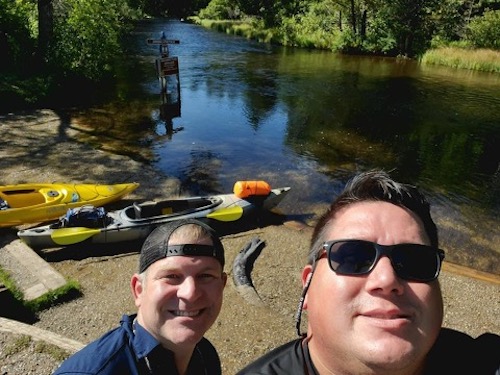 Niklowicz’s journey to becoming a therapist was more telegraphed, as both of his parents work in mental health, and he said it was always something he wanted to do, as well.
Niklowicz’s journey to becoming a therapist was more telegraphed, as both of his parents work in mental health, and he said it was always something he wanted to do, as well.
He attended Virginia Tech on a wrestling scholarship, but transferred to Eastern Michigan after one year. The Hokies had recruited him to wrestle at 133 pounds, but when the team’s 125-pounder was injured, Niklowicz was asked to cut down further. Like Millerov, he struggled when his wrestling career ended.
“I just had a really bad taste in my mouth after leaving Virginia Tech and trying to cut all this weight,” he said. “Some of it was I had lost the desire to work out, to wrestle. Fifteen years, roughly, of my life was dedicated to wrestling, and once you stop, what do I do with my winters? What do I do with seven months of the year? It was definitely a part of my identity; that’s why I got into coaching. I did MMA fighting for a little bit to have something competitive.”
Like Millerov, Niklowicz said finding balance was important.
“In the mental health field, specifically, there’s a lot of burnout for people,” he said. “Every day, you’re listening to people talking about their problems, but at the same time, they’re coming for a reason and they’re there for help, so you have to provide that help and have to motivate yourself to come to the office every day and give it your best. I try to instill the motivation that I used to other people.”
When Niklowicz looks at his time as an athlete compared to his work as a therapist, he said that work ethic is the main characteristic that has carried over.
“I think my practice mentality was the same as it was on the mat,” he said. “Even in the wrestling room, these are people I’m friends with, people I grew up with, and I still didn’t want anyone to score on me. Then you just look at your work ethic outside of wrestling, whether you’re studying for exams or motivating yourself to get up and go to class.”
While they are no longer living in the same town or living similar lives – Millerov is married with three kids, while Niklowicz is single – the connection between Caro’s dominant duo remains strong, both professionally and personally.
“I don’t think we ever thought we would be going down such a similar path, and I doubt that either one of us grew up thinking we would do the exact same thing,” Niklowicz said. “We met when we were 6 years old, and we’ve been best friends forever. I think it’s hilarious that we’ve taken such similar paths but with some glaring differences. It’s definitely interesting that we’re still really good friends after 30-some years, especially since we’ve moved on and gone our separate ways.”
2020-21 Made in Michigan
June 28: Michigan's Minor Leaguers Making Up for Lost Season - Read
PHOTOS: (Top) Caro’s Phil Millerov lifts teammate Phil Niklowicz as both celebrate Division 3 championships during the 2000 Individual Finals at Joe Louis Arena. (Middle) Niklowicz, left, and Millerov were high school warm-up partners despite wrestling at significantly different weights. (Below) Niklowicz and Millerov take a selfie during a hiking trip to Pictured Rocks National Lakeshore in May. (Photos courtesy of Niklowicz and Millerov.)

